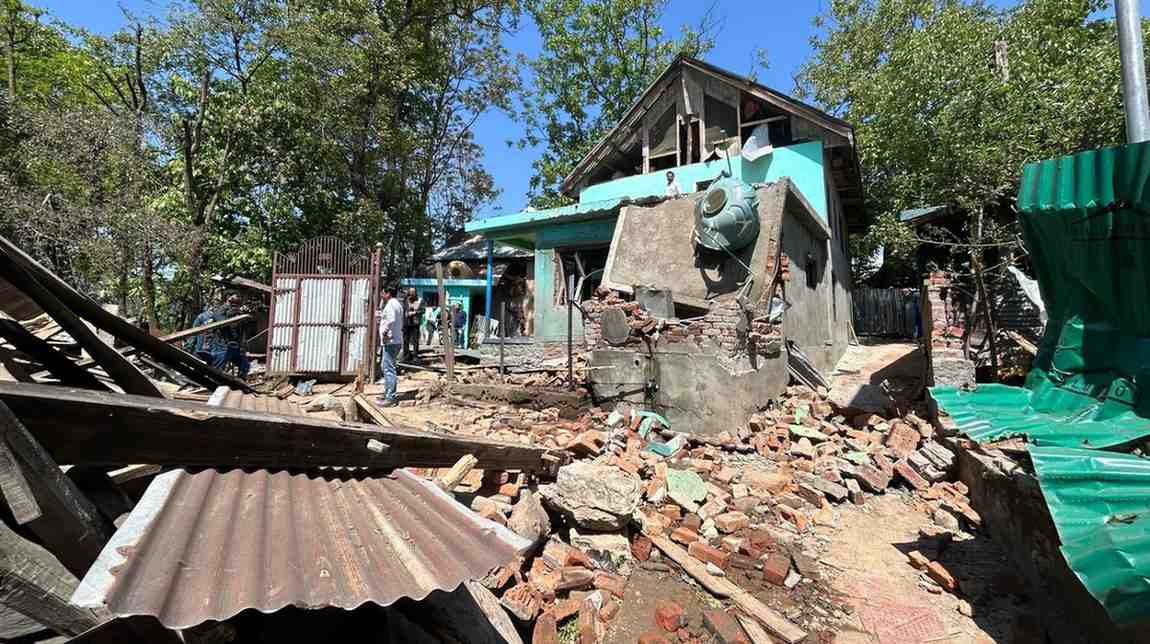The crackdown on those responsible for the recent Pahalgam attack intensified as the houses of two Lashkar-e-Taiba terrorists Adil Hussain Thokar and Asif Sheikh were destroyed in separate security operations across south Kashmir. Authorities confirmed that Thokar’s house in Bijbehara was demolished using explosive devices, while Sheikh’s property in Tral was flattened by a bulldozer late Thursday night.
The attack that rocked Baisaran, a renowned meadow near Pahalgam often dubbed “mini Switzerland,” claimed 26 lives, including one Nepali citizen. Survivors of the attack described the assailants dressed in camouflage and armed with assault rifles emerging from the surrounding pine forests.
Adil Thokar has emerged as a critical figure in the case. Police believe he facilitated the movements of the Pakistani attackers through the terrain, having received training across the border after travelling to Pakistan via the Attari-Wagah route in 2018. Upon his return to Jammu and Kashmir last year, Thokar became a key local enabler for the foreign militants.
2 Among 4 Terrorists Identified as Pakistani Nationals
Officials have also identified the two Pakistani nationals suspected of having directly executed the attack. Known by aliases Ali Bhai and Suleman, their real names are Ali Talha and Hashim Musa, respectively. Both are believed to be experienced militants affiliated with the LeT and have been active in the Kashmir Valley for over a year. Musa has reportedly been linked to several previous attacks targeting both civilians and security personnel.
In a major development, Anantnag Police has released sketches of the trio and offered a Rs 20 lakh reward for information leading to the arrest of any of them. The most-wanted notice also includes details about their operations, with investigators suggesting that the attackers used body-mounted cameras to document the massacre, and had stocked up on medical kits and dry fruits evidence of detailed logistical planning.
The killings have triggered a serious diplomatic rupture between New Delhi and Islamabad. Following an emergency security meeting chaired by Prime Minister Narendra Modi, India unveiled a set of stringent measures against Pakistan. These included the suspension of the Indus Waters Treaty, the closure of the Attari land transit point, visa cancellations for Pakistani citizens, and the downgrading of diplomatic ties. In retaliation, Pakistan barred Indian-owned aircraft from its airspace and expelled Indian military personnel from its embassy.
Explosives Found at Suspects’ Homes
Officials also revealed that during the operations at Thokar and Sheikh’s homes, planted explosives detonated, further supporting suspicions of the terrorists’ elaborate preparations. A search effort continues in the region, with several overground workers and local sympathisers being questioned to unearth further details about the network that facilitated the massacre.
As investigations deepen and search operations intensify, security agencies remain focused on capturing the surviving perpetrators. The Pahalgam tragedy has not only exposed a sophisticated terror plot but has also reopened conversations about cross-border militancy and the fragile peace in the valley.


